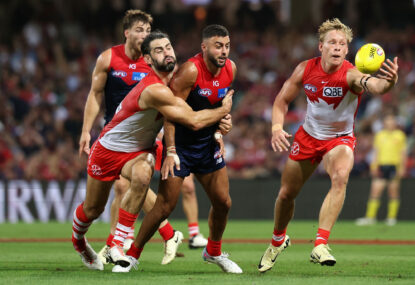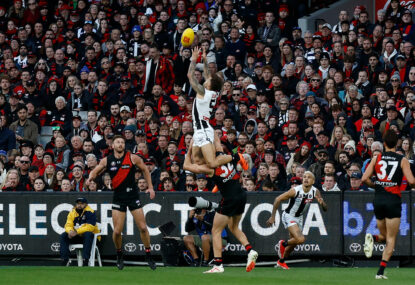The second piece in our four-part series on the mythological championship belts is the ruckman belt.
As was the case with the midfielder’s belt, there is a requirement for the player to be outstanding overall in their position.
For a ruckman an ability to influence the contest, be a part of a title-challenging team and have an impact on his team around the ground are the requirements.
As was the case with the midfielders, the onus is on the contender to put in sustained performances to prove he has defeated the incumbent. That is the champion’s advantage.
Current champion
2012 –? Sam Jacobs
Jacobs has taken full use of the champions advantage over the past two seasons, with other contenders in Will Minson and Todd Goldstein not in contending teams, Nic Naitanui stuck in a time share, and Matthew Leunberger injury plagued.
Jacobs claimed the mantle from Dean Cox by leading Adelaide to a whisker of a grand final in 2012. His 61 hit-out performance in the Showdown of 2012 saw Jacobs’ title reign commence.
2011 – 2012 Dean Cox
Cox joins Jim Stynes as the only other dual-title holder of the ruckman’s championship belt. While this reign was not as lengthy, it still included another preliminary final berth.
If Brownlow votes are something to go by, Cox’s 2011 season may have been his best ever, receiving 18 votes that year.
2009 – 2011 Aaron Sandilands
Sandilands’ 30-30 game against West Coast in 2009 was the start of his reign. Over the following two years Sandilands was a key driver in Fremantle’s resurgence up the ladder, with his ability to link with a budding midfield group giving Fremantle its best hope for success in their 15-year history to that point.
Ultimately it was only injury that took the title away from Sandilands, whose 2011, 2012 and 2013 seasons were wrecked by ongoing injury concerns.
2004 – 2009 Dean Cox
An epic five-year-plus reign was testament to what Cox did for the game of AFL and the art of the modern ruckman. Cox started his title reign by both succeeding Michael Gardiner at the Eagles and as the game’s premier big man.
Cox combined outstanding work rate and agility to outwork opponents. Not unlike Jim Stynes, a decade earlier, Cox was clearly ahead of his time.
The difference to Stynes was that the rest of the league would recognise and ultimately start to mimic what Cox did.
2003 – 2004 Michael Gardiner
Before Cox it is easy to forget that West Coast had the next big thing in Gardiner. Gardiner enjoyed a stellar 2003 season showing a fondness for linking with another young Eagle, Ben Cousins.
Primed for big things going into 2004 and beyond, his title reign was ended by injury, with his protégé Cox taking the mantle as West Coast’s number one and premier ruckman in the game.
2000 – 2003 Mathew Primus
As one of the inaugural Port Adelaide players, Primus grew with the club and was key to the club becoming perennial contenders in the early days of the millennium.
An outstanding tap ruckman, Primus also found an ability to have an impact around the ground. A leader on-field, the Power midfield seemed to always play with a certain level of aggression with Primus the architect of this attitude to do whatever was required.
1998 – 2000 Matthew Allan
During the 1999 and 2000 season Allan formed a remarkable stoppage relationship with Brett Ratten. Over the 1999 and 2000 period they became the best tap duo in the game, and again paved the way for true one-two combinations that became the norm over the next decade.
Allan’s performances rarely dipped; when he was the game’s best ruckman you could guarantee 25 hit outs and 15 possessions a game.
1997 – 1998 Shaun Rehn
After Corey McKernan threw his title away with a string of below-average performances at the start of 1997, there were two challengers to a vacated title, Paul Salmon and Rehn.
While Salmon enjoyed a veteran resurgence in 1997 and 1998, Rehn returned from injury to help contribute to consecutive flags. Rehn was an outstanding tap ruckman who continued to work on his all around game throughout his career. But really it was his ability to start attacking play for Adelaide from the contest that made him so valuable.
1996 Corey McKernan
McKernan had one of the great ruckman years in 1996 and should have been rewarded with a Brownlow if not for a silly indiscretion.
Instead McKernan has to settle in the knowledge that for that one year his ability to have an impact on the scoreboard and the contest made him the best ruck in the game.
1993 – 1996 Jim Stynes
Stynes won the belt back from Scott Wynd in 1993 by sheer weight of numbers over Wynd’s stoppage presence. From 1993 to 1996, Stynes was untouched. People often talk about Cox being ahead of his time and a game changing ruckman, Stynes was every bit the player Cox was and came into the league 15 years earlier.
The only disappointment of his second stint was that he could not lift Melbourne to another grand final berth.
1992 Scott Wynd
In 1992 Wynd and fellow Brownlow medallist Tony Liberatore enjoyed a season of beauty. The connection the two had around stoppages was unprecedented.
Wynd was rewarded for his 17 hit out and 17 possession averages with the Brownlow in 1992 and cemented his legacy as another ruckman who was before his time.
His battle with Stynes over the early 1990s was an underrated one and at least for one season, Wynd could claim to be the superior ruckman.
1990 – 1991 Jim Stynes
While Stynes’ 1991 Brownlow Medal-winning season was among the best of all time by a ruckman, it was his 1990 season that set the platform for what he would do the following season.
In 1990 Stynes averaged 17 possessions and 11 hit outs per game. Spurred by a fourth straight year of falling short in the finals, Stynes put Melbourne on his shoulders, leading what was a lesser side from those four previous ones back to the finals.
He averaged over 25 possessions a game while continuing to have 11 hit outs and go against a group of ruckmen that included Wynd, the Madden brothers and Damian Bourke.


































































































